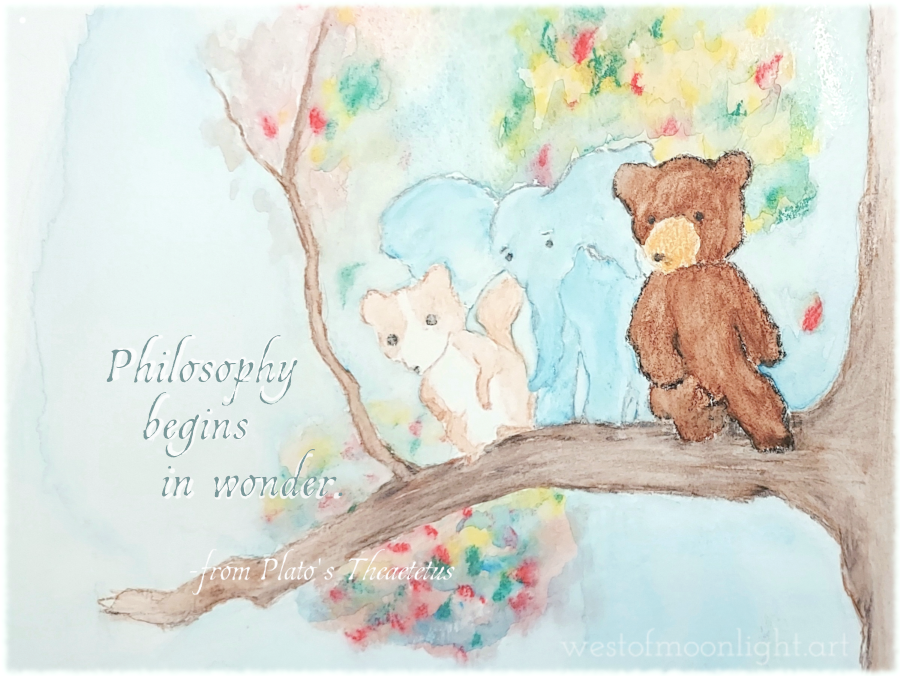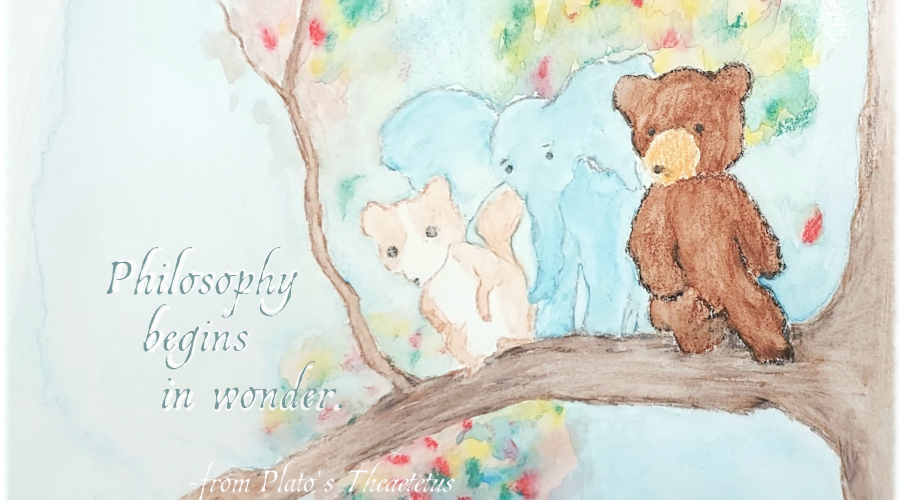Some people are called to do great things, like compose Beethoven’s Ninth Symphony, or be the mother of the man who wrote Moby Dick, or invent the electric tea kettle. My calling is less beneficial to the human race, but we don’t get to choose. In the nature of the case, a calling seeks us out and summons us, sometimes pestiferously. I did not choose to fashion myself thus, and I doubt my mother saw it coming when she suggested I could study accounting. Apparently I am called to be a spackle interpreter.
There is as yet no degree for this. If there were, it might involve rambles to look at the clouds, and puzzle out what they are trying to be.
But I grew up in a crispier part of the torrid zone: I don’t remember a lot of cloudy days. I remember the stars, and I remember the ceiling… from the time I could climb up to the top tier of the triple bunk and lie there and touch the contours of the paint overhead, I remember the pictures behind my fingertips. Now everywhere I look: on variegated countertops, paint-textured walls, marbled floors, I am surrounded with characters enacting stories that have never been told.
Sometimes they make me laugh out loud: like this teddy bear and elephant, and whatever-that-is, looking up at me from a perch on a mottled floor. Anyone passing by would have thought my mind was a little rickety, laughing at floors. But the stories that have never been told are sometimes just very silly. Why should an elegantly dressed dog address a bunch of ragged goats? And how does a moose come to marry a muskrat? And why is their offspring elbowing its way along in front of the bathtub, when I would really like a little privacy? I cannot even imagine how explicable life would be amid blank walls. If I pull out the cutting board to chop chicken for dinner … there are a dozen creatures, each in the flourish of some momentous, and utterly bewildering deportment of its own. Most of them take their leave and never tell me where they are going; and what do they mean?
This is the burden of being a spackle interpreter. I have to explain what they mean. It will not add much to wisdom or, gratefully, to the misery of the world. But if I don’t draw some of these pictures at once, they will never be remembered; and if I don’t make up a story for them, they will never mean anything at all.
So here is a story for these three.

Once upon a time,
there was a lonely elephant, almost entirely made out of air. Almost. Only his eyebrows and toenails contained denser material. It was a lonely life for him, because anytime he got close to another being, that being was bound to inhale and suck him right up, right into its lungs! Then there was coughing, and wheezing, and beating of the breastbone, and harumphing – it was the irritating effect of the eyebrows, mostly. Until the elephant was able to be expectorated.
In this pitiable and isolating condition he had drifted for many years, suddenly swept up into and swooshed forth from the insides of other animal’s bodies. Until one day, wafting about, he found a stuffed bear perched in a tree. The bear was not breathing. Being only stuffed, it could not. So the elephant was able to sit next to him quite comfortably; and the only rustle between them was not from the bear’s squishy nose but from a little wind in the leaves.
They were both swaying gently at ease when all of the sudden, the light breeze was disrupted and the elephant’s ear started suctioning sideways! Not in the direction of the bear, but towards the other side. It floofed and fell, as though it were being vacuumed, and then tossed about by a leaf blower. The elephant knew the sensation well. It was the sensation of increasing nearness to a non-stuffed, Respirating animal! He dug his denser toenails into the tree bark and lifted his irritating eyebrows to look along the outer limb, and there – there it was!
That other creature (whatever it is)!
“Don’t come any closer,” said a muffled voice. “Not unless you hold your breath.” The voice was muffled in the fuzzy chin of the bear, who had been stirred to the defense of his new friend. Though they had never exchanged a syllable, a teddy bear always comes to the defense of a lonely soul.
“Thank you,” whispered the elephant.
The other creature, whatever it is, had often practiced holding its breath so that it could swim across its flooded basement. Therefore, it was singularly adapted to draw near to the elephant. The teddy bear loved it at once, as teddy bears do; and the three of them became friends, none of them giving the least offense to the others, and none of them breathing, for a very long time. And that is how I discovered them, perfectly harmless and quite still.
– That is the story, and the meaning is quite clear. If one is breathing, one is almost certainly giving offense to someone else. (But if you don’t breathe, that doesn’t go well either, so don’t worry about it too much.)
And if you are wondering where we arise to philosophy, because these creatures have some relation to those words of Plato – I think you can puzzle it out.(But if you can’t… the elephant’s name was Socrates.)
- What to Take for a Walk in the Woods - March 6, 2024
- Noodles ‘n Goop, Paper Houses, and Love - November 29, 2023
- Spackle Interpretations, Part II - November 22, 2023

Leave a Reply